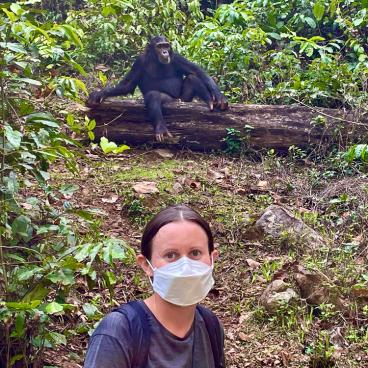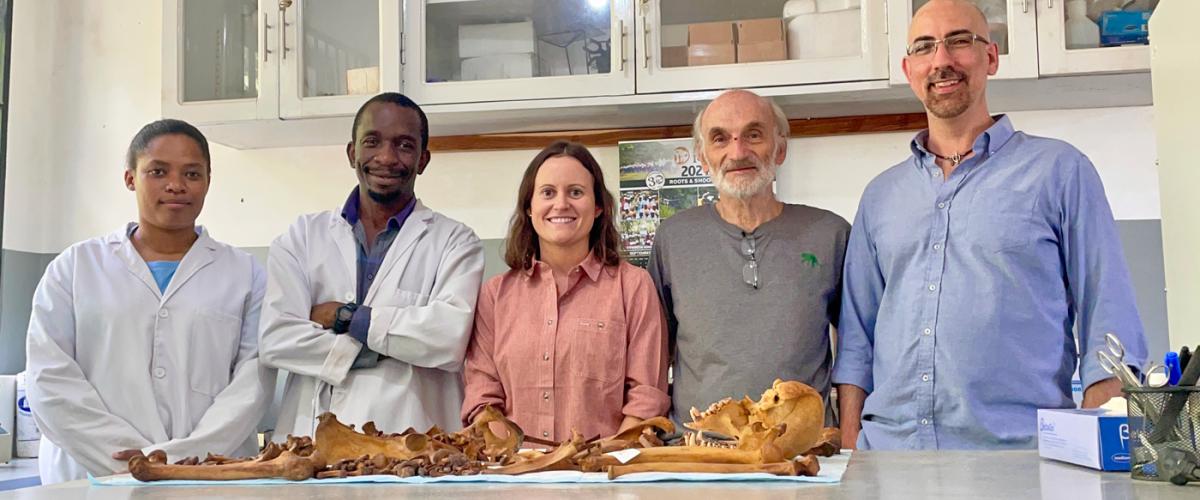Updates from the Field: Jessica Deere, CGHSR Scholar
Jessica Deere (center) stands with project collaborators. From left to right: Priscilla Shao (JGI), Dr. Dismas Mwacha (JGI), Dr. Jessica Deere, Dr. Anthony Collins (JGI), Dr. Thomas Gillespie (Emory University)
Jessica Deere, one of our 2021–2022 CGHSR Scholars, shares an her experiences doing research and field work related to One Health in Gombe, Tanzania.
Jessica Deere received her PhD in 2021 from the UMN College of Veterinary Medicine and is now working as a postdoctoral associate at the Emory University Department of Environmental Sciences. Deere joins the cohort of CGHSR scholars for 2021-2022 to work on a project titled "Greater Gombe Ecosystem Health: A new framework for understanding health at the human-nonhuman primate interface" and will work at the Gombe Stream Ecosystem Health research site in Tanzania along with mentor Dominic Travis, DVM, MPH, of the College of Veterinary Medicine. Deere will also be working with mentors Thomas Gillespie, PhD, at Emory University, and Tiffany Wolf, DVM, PhD from the UMN College of Veterinary Medicine.
Tell us a little bit about your projects.
As part of our goal to initiate community engagement in One Health in the Greater Gombe Ecosystem, I have joined village outreach events with the Jane Goodall Institute’s Landscape Conservation in Western Tanzania (LCWT) team working on reproductive health and family planning. These visits to the outreach clinics have afforded me the opportunity to get to know community health workers, meet community members, and learn more about how health outreach works in the communities surrounding Gombe National Park.
To improve on-site pathogen surveillance and diagnostic capacity in Gombe, our team has purchased the necessary lab supplies and equipment to implement molecular diagnostic capability in the park. We developed a partnership with an in-country biotech supply company to ensure the sustainability of supplies for efficient diagnostic capacity. We expect all supplies to arrive in Gombe by March 2022. We will then work with and train Tanzanian scientists on molecular methods and implement protocols for long-term diagnostic capability in the Gombe Stream Research Centre laboratory.

What have you learned about conducting research in Tanzania that you didn't know before, or that has surprised you?
I think what has been most surprising about conducting research in Tanzania, and more specifically Gombe, is just how hard the field researchers work to collect behavioral and health data on the chimpanzees every single day. I’ve always been very impressed by the incredible database that makes up research in Gombe, but to see the field researchers in action has been eye-opening. Recently, I was following some of the field researchers to track the chimps and several times throughout the hike, I was on hands and knees crawling through brush and thickets, while avoiding thorns. The field researchers do this daily without thinking twice about it. It is very impressive.
How have your mentors supported you?
The support from both my US and international mentors has been instrumental throughout my project. I’ve even gained amazing mentors that I didn’t know I would have. My US-based mentors check in on me often and we have frequent communication about the project. Something we’ve implemented that helps with the time difference is keeping notes on a shared document. That way I can keep notes for myself while also keeping my mentor updated. My Tanzanian-based mentors have made me feel comfortable and welcome and always make sure I have everything I need. The Jane Goodall Institute team, from the US to Dar es Salaam to Kigoma to Gombe, have been very supportive and I have thoroughly enjoyed working with them.
How has the pandemic impacted your work and your travel?
Not surprisingly, the pandemic delayed things at the beginning of the project, but now that I am in Tanzania, I wouldn’t say the pandemic has impacted things greatly. If anything, it has emphasized the importance of the work that we are doing. One good thing about being in a remote, fairly isolated study location is that you have more limited COVID exposure. I wear a facemask (along with the Pathfinder team) during all village outreach events, which is different than what we would have done pre- pandemic. I do think the pandemic has changed how I think about tourists visiting the park (and even my presence in the park). Respiratory disease is a leading cause of death for chimpanzees; we certainly don’t want to expose the chimps to COVID. There are guidelines in place to prevent transmission from humans (proper distancing, limited time viewing the chimps, facemasks required, etc.), which is great, but it makes me think about what more we can be doing to prevent transmission to the chimps while still allowing tourism and research that supports chimpanzee conservation.
What are you enjoying most about being in Gombe, Tanzania?
Definitely getting to see the Gombe chimpanzees in their natural environment. Working and living in Gombe National Park, where Jane Goodall first started studying chimpanzees in the wild over 60 years ago is pretty incredible. I’ve been reading Jane Goodall books since I was 10, so getting to experience it all for myself is exciting. Understanding the risk of zoonotic disease transmission is crucial to human and animal health in systems characterized by high rates of human-animal overlap, like the Greater Gombe Ecosystem. To truly understand and manage the threat of disease to both the chimpanzees and people living near them, we must expand assessments to include local communities that recognize local needs, capacities, and priorities. I’m really excited to be part of the team working on the expansion of One Health in the Greater Gombe Ecosystem.
Updates from the Field
Our Updates from the Field Series features messages from the people around the world that are dedicated to the programs of the Center for Global Health and Social Responsibility.
